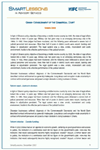Overview
Many developed countries, and countries on their way toward development, have simple, inexpensive and fast property registration processes. Low property registration fees encourage every property holder to receive a formal title. The poor especially benefit, because they can use their property as collateral, start doing business and work to achieve their dreams. This paper discusses the property registration reform in Egypt that focused on two areas: the cost and quality of procedures.
Main Findings
- In Cairo one year ago, registering a property cost, on average, 5.9 percent of its value, causing 90 percent of property to be either unregistered or registered at underestimated values.
- Through reform, the total property registration fees decreased from 5.9 percent to 1 percent of property value, and revenues from title registrations rose 39 percent between the six months before the reform and the six months after.
- In January to May 2006, before the reform, an average of 4,899.2 deeds a month were registered. After the reform, this monthly average jumped to 5,443.4 between January and May 2007.
- The next challenge is to reduce the time needed to register property. Currently it takes an entrepreneur more than six months—too long—to register a property in Cairo. To continue with the reform, computerizing the registry, training registry staff members, keeping records updated, cutting unnecessary procedures and combining other procedures could be the next steps.

